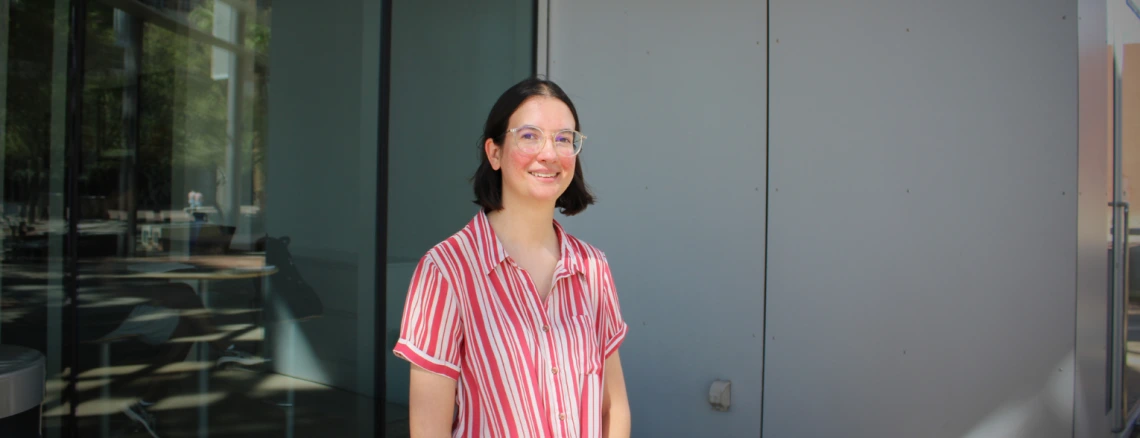From Tumblr Blogs to Academic Journals: My Journey with Bisexual Identity
CALES science communcations intern and HDFS graduate student, Sydney Hainsworth, opens up about their journey with sexual identity.

Growing up in rural Virginia in the early 2000s, I wasn’t around people who were open about any sexual orientation other than heterosexual. Luckily, when discussions of gay or lesbian people did happen, they were usually in a positive light. The same wasn’t true for bisexuals.
I remember hearing a person could be attracted to men or women but that liking both wasn’t possible (and of course there were no conversations about identities beyond the gender binary). As I got older and was around more of these conversations, I began to hear the negative stereotypes about people who “claim” a bisexual identity: “bisexual men are just gay but are afraid to admit it;” “bisexual women are just straight but want to seem more interesting;” “bisexual people can’t be faithful in a committed relationship;” the list goes on and on.
In high school, I was very fortunate find myself in a friend group where one person after another came to identify as and come out to us as a member of the LGBTQ+ community. It was through talking to my friends who were out, as well as scrolling through pages of discourse on Tumblr, that I came to realize my own bisexual identity (years later similar events led to me discovering my non-binary gender identity but that’s a different story).
It was also in high school that I took my first psychology class and fell in love with the social sciences and learning about people and how we work. I carried my newfound love of psychology into an undergrad at the University of Virginia, where I double majored in Psychology and Youth and Social Innovation—which was a new major in the education school that focused on youth development and programming. I also minored in Gender and Sexuality Studies. With these three subject areas, I knew that I wanted to do something that would benefit the lives of LGBTQ+ youth. It took me a while to figure out what exactly I wanted to do but through the help of professors in the education school I figured out that I wanted to be a researcher and go to graduate school.
I am now a Ph.D. candidate in Human Development and Family Sciences at the University of Arizona, where I study how sexual and gender minority youth and young adults come to recognize, understand, and view their sexual orientation and/or gender identity. Specifically, I am interested in bi+ individuals (people who are attracted to more than one gender, also known as bisexual, pansexual, etc.) and non-binary people (people who do not identify as a man or woman). I am interested in these identities not just because they are the groups I happen to identify with, but because they are often overlooked or pressured to pick one side or the other (gay or straight, man or woman).
Most of the research that we do have about LGBTQ+ people encompass primarily white identifying demographics. This means that we know very little about the experiences of BIPOC LGBTQ+ people and there are very few resources for non-white LGBTQ+ people to learn about themselves and others like them. While I am white, I know that it is important to understand the experiences of BIPOC LGBTQ+ people as well which is another factor I like to consider in my work.
For my master’s thesis at the University of Arizona, I decided to compare the identity development of gay/lesbian to bisexual Latine youth. While the negative stereotypes that I heard about bisexual people when I was growing up are not true, research has shown that bisexual people (again, this information is based off mostly white bisexual people) have their own struggles when compared to gay/lesbian people. One big difference is that bisexuals tend to have worse mental health and do tend to question their identity more than gay/lesbian people. Common negative stereotypes about bisexual people are one of the reasons for this, as bisexual people know that many people think these negative things about them. Surprisingly, my research found that bisexual Latine youth had higher levels of sexual minority identity exploration, resolution, and affirmation than gay/lesbian Latine youth. In other words, the Latine bisexual youth and young adults had done more research about their identity, were surer of their identity, and felt more positively about their identity than other gay/lesbian participants.
I also found that having higher levels of identity exploration, resolution, and affirmation was associated with higher self-esteem for all youth, regardless of sexual orientation. This finding helps highlight how important identity development and feeling like you can understand yourself is for all people.
These results go against the stereotypes of bisexuals being “confused” or going through “a phase.” One reason may be that people are beginning to understand and accept bisexual people and the negative stereotypes are starting to fade.
As I continue with my education and career, I want to continue learning about identity development to help youth who are going through this process and the adults that care about them. After graduating with my Ph.D. I want to be a research scientist at a nonprofit organization that allows me to share research about LGBTQ+ people with as many people as possible, so that we can all feel loved and safe to explore who we really are.
